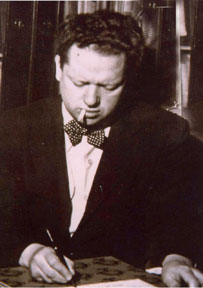The poet who never knew himself !
by Gwen Herat at the Dylan Thomas Centre, Swansea,
South Wales
 |
|
Dylan Thomas, the iconic
poet who never found himself. The celebrity a well-groomed
poet signs books and
records at the Gotahm Book Mart in New York. |
Like the park birds he came early
Like the water he sat down
And Mister they called Hey Mister
The truant boys from the town
Running when he had heard them clearly
On out of sound...
From The Hunchback in the Park Was this a prelude to a part of his
life? A shadow reflecting of his lonely figure cramped into his young
life?
Dylan Thomas, the Bard of Wales is next only to William Shakespeare
from the world of literature, both icons in their own right. Nobody knew
who the real Dylan Thomas was. How could they when he never knew
himself! He was a wild Welsh boy who roared through his brief life. He
was the doomed poet who praised the fleeting beauty of youth and
innocence.
Real Dylan
Which of these images is nearest to the real Dylan? Your guess is as
good as mine. I visit the Dylan Thomas Centre in South Wales annually
but his real image is still a mystery to me. He was a man of Swansea,
born and nurtured in its green environment, the base for his future
works. It is difficult to establish what is true or not about Thomas but
he has always been described as an exciting, stimulating and compelling
writer who raced through: life to reach dizzy heights in his iconic
works.
During his lifetime being described as the greatest living poet in
the English language, amounts to his father stimulating him with
Shakespeare's writing. But Thomas who greatly appreciated the Bard's
work, never allowed him to be influenced. Thomas' was different. They
were more evocative and lyrical accessible to the average people of his
time, especially the English speaking Welsh.
'Now as I was young and easy under the apple bough.
About the lilting house and as happy as the grass was green.
The night above the dingle starry.
Time let me hail and climb.
Golden in the heydays of his eyes
And honoured among the wagons I was the prince of the apple town
And once below a time. I lordly had the trees and leaves
Trail with daisies and barley
Down the rivers of the windfall light.
From – Fern Hill
Parents
 |
|
The breath-taking beauty of lush green
Wales that inspired and nurtured him to greatness. |
Thomas was the product between two very different parents. His father
was a frustrated and an angry would-be poet who was a teacher in a
provincial school. His loving mother was less complexed and came from a
close-knit family. She was a happy, radiant person who showered love and
care on her children in excess. The different temperaments between the
two caused tension on Thomas's life, especially when he was launching
his poetic career. Of course, he was blissfully unaware of these facts
because he had a doting mother and an elder sister, a live-in maid who
was protective of him.
Early life
Dylan is a name from an ancient Wales myth and and religion and from
the days before the dawn of Christianity, from a thousand years before
the English appeared in Britain. Even at a tender age, Thomas was very
mindful about this and was proud being a Welsh. The language of both
families was Welsh but he was forced to speak only English. Thomas Snr.
Knew his son was a challenge for the future and readied him for it.
Thomas learned early and remarkably well astonishing his father beside
his teachers but he was a sick child. However when it came to playing
with other children, he became robust, especially at Cwindonkin
Wonderland Park just across his home.
Perhaps because of his protected childhood, Thomas dreamed of a
Paradise he could escape to. In his poems of 'Fern Hill' he summoned up
his dream-world giving a most powerful and evocative description of
childhood he had ever written. His teens saw two inspirational and
recreation of the innocence of childhood and freshness of the world in
'A child's Christmas in Wales' and 'a story'. Though it is not mentioned
anywhere I am sure, that Thomas wrote these two poems for his mother
whom he loved and who inspired him in simple ways unlike his
professional father.
'Under the Milk Wood' was the classic that pushed him right to the
top. This literary gem was made into an epic Hollywood film and was
featured on the BBC. Thomas's other interests were the theatre and he
performed in school plays and in various other amature productions over
the years at the Swansea Little Theatre. His talent stood out because of
his exuberance and gentle personality that took him to the BBC and with
his reading tours to the United States.
He continued to write and became obsessed with it when he experienced
music in his words. He also wrote many successful short stories, arguing
that life cannot exist without death nor death without life. He
indicates so in 'Fern Hill', his best known poem in his first
collection.
Elemental energy
He was fired by elemental energy, that an individual is only a small
insignificant part of a cosmic order. Did he believe in rebirth? No one
was able to answer because as I stated earlier, Thomas and the literary
world never knew who the real Dylan Thomas was. He believed that when an
individual died, life was never-ending but repeated for ever in the
cycle of sex, birth, life and death. If this is Buddhist philosophy;
then Thomas had the right to believe in rebirth.
The major subjects that dominated his writings were life, death,
creativity and destruction which are apparent in his early works.
His wife, Pamela Johnson was apprehensive about his heavy drinking
and wayward behaviour which made him irresponsible, forgetful of his
duties as a husband and a father. In many ways he appeared to be his own
enemy that led him to fear and uncertainty. This vicious cycle led him
to his early death in a foreign land.
Why did it happen that way?
Great artist
He was a great artist and blessed with a ferociously devoted wife who
was very supportive and who suffered a great deal with their three
children when Thomas was down and out, almost like destitutes living on
the dole. But Thomas picked up his brilliant career. His 'collected
poems' when published in 1952, acclaimed him as the greatest living
poet.
Ten thousand copies were sold in the first year, 20,000 in the second
year in the United Kingdom alone. More copies were sold in the United
States.
'Under Milk Wood' showed the charm of Thomas' confident, secure and
loving nature. Although he discovered a deeper significance in life. He
was unable to turn success into spectacular heights but stumble into
irredeemable failure. Frustrated with drinks overtaking his young life,
he gave up the urge to live. He fell sick and was hospitalised at St.
Vincent's Hospital. He remained in a coma for four days and on November
9, 1953 died peacefully, Pamela brought his body from New York to
Laugharne where it was buried in the churchyard.
No one will ever know why the young Thomas, the great poet who had
survived many a miserable failure for so many years, was unable to live
with what was now apparent success.
Did he commit suicide, 'insult to the brain', alcoholic poisoning,
diabetes, shock, effects of drugs taken to control pneumonia. These
still remain mysteries.
Dylan Thomas only began his gigantic, iconic literary career. Had he
lived his full life, we would be idolising him and not William
Shakespeare!
|

